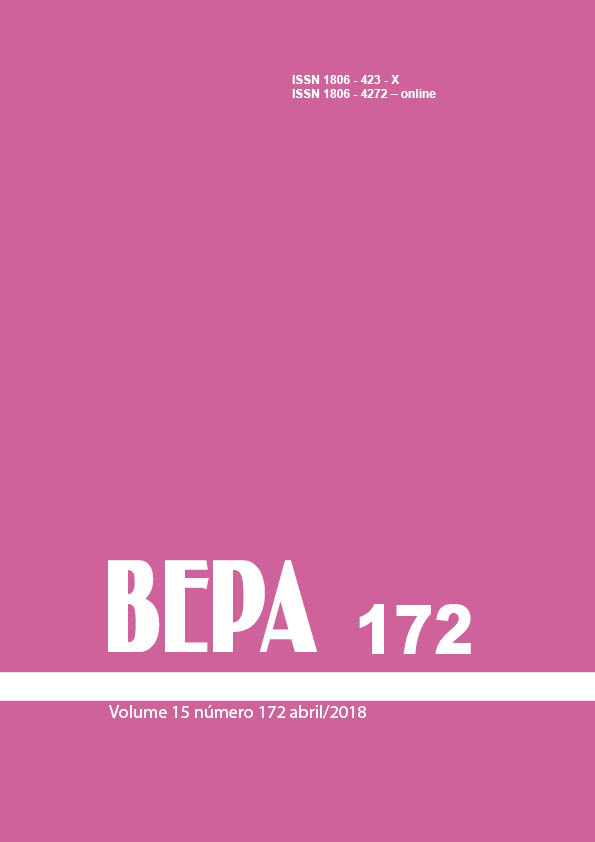Abstract
The objective of this study was to analyze the population of Lutzomyia
longipalpis in a municipality with intense transmission of visceral
leishmaniasis and another with no transmission of the disease in the
state of São Paulo. Surveys in the peri and intradomicile were carried
out with Lighted Bait Traps from January to December 2013 in the two
municipalities. The number of individuals and abundance classes were
adjusted in negative binomial regression models with the objective of
verifying the predominance of this species in the home environment
and the best regression model. The results showed that the number of
males and females was greater in the peri and intra-household of the
municipality with transmission of the disease. The model with abundance
classes obtained better performance in relation to the model with the
number of individuals. However, the great challenge remains to establish
the relationship between the entomological indicators and the risk of
transmissio
References
Brasil. Ministério da Saúde. Secretaria
de vigilância em Saúde. Manual de
Vigilância e Controle da leishmaniose
visceral americana. Brasília. 2006; 120 p.
Silva LB, Aquino DMC, Leonardo
FS, Silva ASG, Melo MN, Rebêlo
JMM, Pinheiro VCS. Flebotomíneos
(Diptera, Psychodidae) em focos
urbanos de leishmaniose visceral
no estado do Maranhão, Brasil. Rev
Patol Trop. 2015; 44 (2): 181-93.
Costa PL, Data-Torres F, Silva FJ,
Guimarães VCFV, Gaudêncio K, BrandãoFilho S P. Ecology of Lutzomyia longipalpis
in an area of visceral leishmaniasis
transmission in north-eastern Brazil.
Acta Trop. 2013, 126 (2013) 99-102.
Amorim CF, Amora SSA, Kazimoto
TA, Costa KFL, Silva LF, Maciel MV.
Levantamento de flebotomíneos às
margens do Rio Mossoró no nordeste
do Brasil. Rev Baiana de Saúde
Pública. 2015; 39(3):584-97.
Vianna EM, Morais MHF, Almeida AS,
Sabroza PC, Reis IF, Dias ES, Carneiro
M. Abundance of Lutzomyia longipalpis
in urban households as risk factor of
transmission of visceral leishmaniasis.
Mem Inst Oswaldo Cruz.
; 111(5): 302-10.
Rangel O, Sampaio SMP, Ciaravolo
RMC, Holcman MM. The distribution
pattern of Lutzomyia longipalpis (Diptera:
Psychodidae) in the peridomiciles of a
sector with canine and human visceral
leishmaniasis transmission in the
municipality of Dracena, São Paulo, Brazil.
Mem Inst Oswaldo Cruz 2012; 107:163-9.
Ciaravolo RMC, Oliveira SS, Hiramoto
RM, Henriques LM,Taniguchi HH, Junior
AV, Spinola R, Rangel O, Tolezano
JE. Classificação Epidemiológica dos
Municípios Segundo o Programa de
Vigilância e Controle de Leishmaniose
Visceral no Estado de São Paulo,
dezembro de 2014. Bol Epidemiol
Paulista. 2015; 12(143), 9-22.
Fundação Sistema Estadual de Análise
de Dados. Portal estatística do estado
de São Paulo. São Paulo. Fundação
SEADE. [acesso em 18 de julho de
. Disponível em: http://www.
imp.seade.gov.br/frontend/#/
Secretaria de Estado da Saúde.
Coordenadoria de Controle de Doenças.
Comitê de Leishmaniose Visceral
Americana. Classificação epidemiológica
dos municípios Segundo o Programa de
Vigilância e Controle de Leishmaniose
Visceral Americana no Estado de São Paulo.
Bol Epidemiol Paulista. 2010;7(77):21-40.
Akaike H. A new look at the statistical
model identification. IEEE Trans
Automat Contr. 1974; 19: 716-23.
Stasinopoulos DM, Rigby RA. Generalized
additive models for location scale and
shape (GAMLSS) in R. J Stat Soft. 2007;
(7): 1-46. [acesso em 18 julho de 2018].
Disponível em: https://www.jstatsoft.
org/article/view/v023i07/v23i07.pdf.
Holcman MM, Sampaio SMP, Rangel
O, Casanova C. Spatial and seasonal
distribution of Lutzomyia longipalpis
in Dracena, a city in the western region
of the State of São Paulo, Brazil, that is
endemic with visceral leishmaniasis. Rev
Soc Bras Med Trop. 2013; 46(6):704-12.
Alexander B. Sampling Methods
for Phlebotomine Sandflies. Med
Vet Entomol. 2000; 14: 109-22.
Costa PL, Dantas-Torres F, da Silva
FJ, Guimarães VC, Gaudêncio K,
Brandão-Filho SP. Ecology of Lutzomyia
longipalpis in an area of visceral
leishmaniasis transmission in north-eastern
Brazil. 2013; Acta Trop.126: 99-102.
Salomón OD, Feliciangeli MD, Quintana
MG, Afonso MMS, Rangel EF. Lutzomyia
longipalpis urbanisation and control. Mem
Inst Oswaldo Cruz. 2015; 110(7): 831-46.
Fernández MS, Santini MS, Cavia R,
Sandoval AE, Pérez AA, Acardi S, Salomón
OD. Spatial and temporal changes in
Lutzomyia longipalpis abundance, a
Leishmania infantum vector in an urban
area in northeastern Argentina. Mem
Inst Oswaldo Cruz.2013; 108: 817-24.
Santini MS, Fernández MS, Pérez AA,
Sandoval AE, Salomón OD. Lutzomyia
longipalpis abundance in the city of
Posadas, northeastern Argentina: variations
at different spatial scales. Mem Inst
Oswaldo Cruz.2012; 107: 767-71.
Fernández MS, Salomón OD, Cavia R,
Pérez AA, Acardi SA, Guccione JD.
Lutzomyia longipalpis spatial distribution
and association with environmental
variables in an urban focus of visceral
leishmaniasis, Misiones, Argentina.
Acta Trop. 2010; 114: 81-7.

This work is licensed under a Creative Commons Attribution 4.0 International License.
Copyright (c) 2018 Osias Rangel, Susy Mary Perpetuo Sampaio, Lilian Aparecida Colebrusco Rodas Colebrusco Rodas, Tiago Leonetti Coutinho
